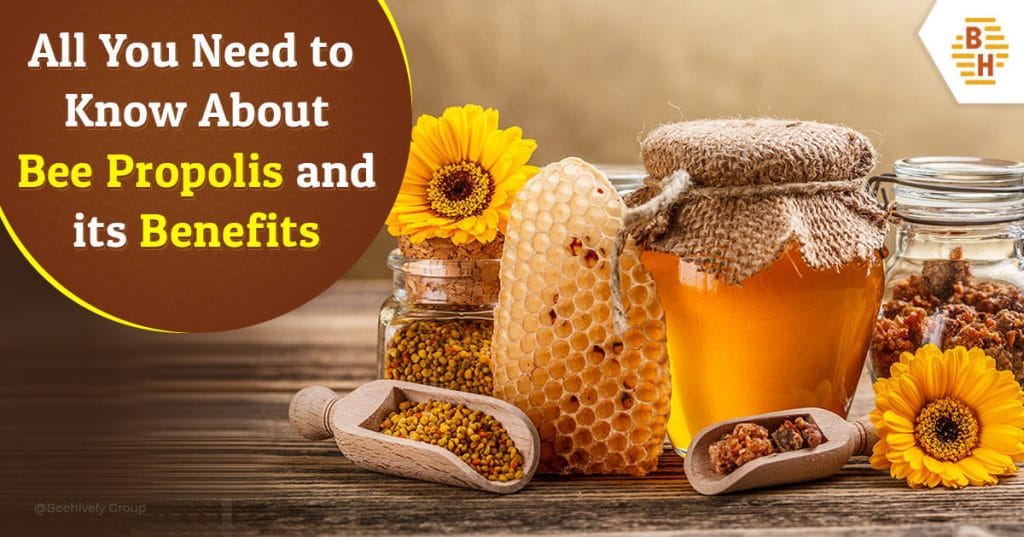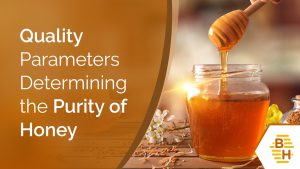Familiar with its use, beekeepers continuously witness bees employing the sticky, resinous ‘bee glue,’ known as bee propolis to line the inside of the hive. Beekeepers can scrape as much propolis as they want from the hive for business purposes, honeybees can simply replace it. The bees seal each and every little gap with propolis in the hive including the hive entrance, walls, as well as the honeycomb. The bees keep their hive together by smoothening rough surfaces, sealing crevices with propolis. This allows the colony in the hive to control airflow inside the hive.
How do Bees Prepare Propolis?
Propolis – a natural substance is gathered by bees from resins of plants like, poplar, palm, pine, gums, mucilage, and leaf buds. Worker bees collect the resins very meticulously on their legs in their pollen baskets to the hive. As the resins are very sticky, it is not possible for worker bees to unload it themselves, thus another bee helps them in unloading their bounty for them in the hive.
Then the bees blend the gathered resins with wax, honey, and enzymes from their stomachs converting it into the very beneficial substance that we call propolis. The final composition of propolis comprises of 50% resins, 30% waxes, 10% essential oils, 5% pollen and 5% plant debris. Each hive prepares different propolis, which is typically based on the variety of unique resins collected from local trees.
How Does Propolis Benefit Humans?
Humans have been learning abundantly from bees for ages. For instance, bees have been clever enough to recognize the antimicrobial properties and use it when a colony is sick to fight off infection.
Research has been conducted to understand the use and benefits of propolis to human body. The research has shown that propolis has antibacterial, antiviral, antifungal, and anti-inflammatory properties and humans are employing its beneficiary properties for various purposes. Here are some advantages of propolis –
1. Propolis can Heal Wounds
There has been an increasing interest in the healing potential of natural products like bee propolis. It has been found that it contains a huge number of compounds that explain some biological effects that speeds up the wound healing process in humans and it is also extensively used in folk remedies. Propolis carries a special compound called pinocembrin, a flavonoid that functions as an antifungal. The anti-inflammatory and antimicrobial properties help in healing wounds.
A research found that a topical propolis alcoholic extract is more effective than a steroid cream in decreasing mast cells in oral surgery wounds. Mast cells are related to inflammation and slowed healing of wounds.
2. Propolis Helps in Maintaining Oral Hygiene
Research have also shown that propolis has the potential to prevent the formation of calcium phosphate- the main component of dental plaque making it a useful ingredient in dental care products.
3. Propolis can Treat Herpes
As per research in the journal Complementary Therapies in Medicine propolis can work as an alternative treatment for genital or oral herpes. Oral herpes is generally caused by HSV-1 virus which can result in cold sores. On the other hand, HSV-2 is sexually transmitted, and leads to an infection that can cause painful blisters on the genitals.
The research analyzed numerous trials of honey and bee propolis to comparing their effects with those of acyclovir- a common medication for HSV virus. The results showed that in 4 out of 6 trials propolis was more effective than acyclovir to heal HSV skin lesions, especially cold sores.
Frequently Asked Questions About Propolis
Does Honey Contain Propolis?
Certain kinds of honey may contain a small amount of propolis. To gain some benefits of propolis from honey, consume only raw honey that is unfiltered and unpasteurized as heat can destroy the healing qualities of propolis.
How do Beekeepers Harvest Propolis?
Propolis is harvested by beekeepers by placing a flexible plastic screen with cracks on top of the frames in the beehive, below the hive cover. The painstaking bees will immediately start working on sealing all the cracks in sight with propolis. Beekeepers then remove this plastic screen and temporarily place it in the refrigerator or freezer. This will turn the soft and sticky propolis brittle in the cold. Finally, beekeepers bend the screen and easily crack the brittle resin off it to collect the propolis.
Bee Propolis - Another Special Gift by Bees to Humankind
Propolis is available in many forms over the counter in tablets, capsules, powder, and extract. It is also found in ointments, creams, lotions, and other personal-care products. It is always recommended to see a doctor before using it for medicinal purposes.
Propolis is typically safe for humans at reasonable doses, both on the skin and for internal use. Nevertheless, propolis can contain a wide variety of compounds depending on where it came from, thus it is not always possible to be sure of substances it is made up of. To gain the nourishing and healing properties of bee by-products like propolis, it is recommended to buy propolis that is raw and procured without harming or killing honeybees. BeeHively Group is a honey and bee by-products provider that collaborates with tribal beekeepers to deliver natural and organically sourced raw honey and bee by-products to customers across the globe.
Contributing Writer: Harshita is a Content Writer at Panamax. Inc. MBA in HR & Marketing, she found her calling in Content Writing. In a short span of 2 years, she has explored writing in different styles of content like Coffee table books, website content and for media.




